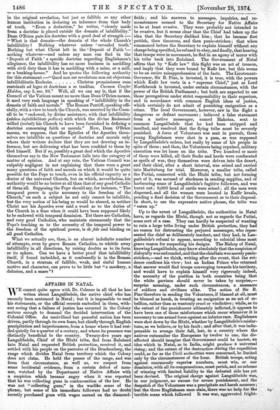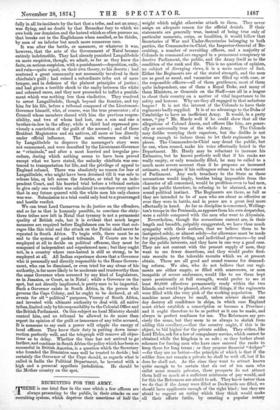AFFAIRS IN NATAL
AVE cannot quite agree with Dr. Colenso in all that he has writen about Langalibelele, the native chief who has recently been sentenced in Natal ; but it is impossible to read his statements, or the official records embodied in them, with- out seeing that a failure of justice has occurred in the Colony serious enough to demand the decided intervention of the Colonial Office. An uncivilised but peaceful nation has been driven, partly through its own fears, but chiefly through English precipitation and imperiousness, from a home where it had resi- ded quietly for a quarter of a century, and where its presence was clistinctly beneficial to the country. Twenty-five years ago Langalibelele, Chief of the Hlubi tribe, fled from Zululand into Natal and requested British protection, received it, and settled with his people on the pastures of the Drachenberg, the range which divides Natal from territory which the Colony does not claim. He held the passes of the range, and was from that circumstance, as well as, we suspect from some incidental evidence, from a certain defect of man- ner, watched by the Department of Native Affairs with a suspicion which became angry when it was reported that he was collecting guns in contravention of the law. He was not "collecting guns," in the warlike sense of the phrase, but some of his immediate followers had no doubt secretly purchased guns with wages earned on the diamond- fields ; and his answers to messages, inquiries, and re- monstrances seemed to the Secretary for Native Affairs to be at least evasive. They were probably not intended to be evasive, but it seems clear that the Chief had taken up the idea that the Secretary disliked him ; that he became first pettish, then timorous, and then panic-stricken; that when summoned before the Secretary to explain himself without any charge being specified, he refused to obey, and finally, that hearing that troops were in movement, he fled in an agony of terror with his tribe back into Zululand. The Government of Natal affirm that by 44 Kafir law" this flight was an act of treason, and imply that they were bound by Kafir law, but this seems to be an entire misapprehension of the facts. The Lieutenant- Governor, Sir B. Pine, is invested, it is true, with the powers which Kafir law vests in a "supreme Chief," just as Lord Northbrook is invested, under certain circumstances, with the power of the British Parliament; but both are expected to use those prerogatives under strict responsibility to their superiors, and in accordance with common English ideas of justice, which certainly do not admit of punishing emigration as a crime. The local Government, however, saw in the flight a dangerous or defiant movement ; believed a' false statement from a native messenger, named Mahoiza, sent to summon Langalibelele that he had been stripped and insulted, and resolved that the flying tribe must be severely punished. A force of Volunteers was sent in pursuit, three young Englishmen were shot in a pass, as was supposed by Langalibelele's orders, but really by some of his people in spite of them ; and then, the Volunteers being repulsed, military execution was let loose on the tribe. Two hundred or more of them were killed, all their flocks and herds were confiscated as spoils of war, they themselves were driven into the desert, and their chief, after a short interval, was seized and carried into Maritzburg for trial. Moreover, a smaller tribe, called the Putini, connected with the Hlubi tribe but not forming part of it, was accused of slackness in sending supplies, and of harbouring some of Langalibelele's fugitive followers, and was burnt out; 8,000 head of cattle were seized ; all the men were dispersed, and all the women were located in Kaffir kraals, pending a final decision of the Government as to their disposal. In short, to use the expressive native phrase, the tribe was "eaten up."
Up to the arrest of Langalibelele, the authorities in Natal have, as regards the Hlubi, though not as regards the Putini, some sort of a case. They can hardly be suspected of wanting to ruin a large tribe living under British protection, they had no reason for distrusting the perjured messenger, who repre- sented the chief as deliberately insolent, and they had, in Lan- galibelele's refusal to appear, according to colonial ideas most grave reason for suspecting his designs. The Bishop of Natal, knowing Langalibelele may know absolutely that the suspicion of disloyalty was unfounded, and that the chieftain was merely panic- stricken,—and we think, writing after the event, that the evi- dence confirms his view ; but an Indian Prince who returned that answer would find troops converging towards his territory, and would have to explain himself very rigorously indeed, the necessity of the position in both countries being that the white garrison should never be taken by surprise,— surprise meaning, under such circumstances, a massacre
of soldiers and civilians alike. The action of Sir B. Pine therefore in sending the Volunteers, if blamed at all, must be blamed as harsh, in treating an emigration as an act of re- bellion, rather than as wantonly cruel or vindictive ; while, as to the extent of the punishment ultimately inflicted, it appears to have been one of those misfortunes which occur whenever it is necessary to use armed force against an inferior race. Englishmen were shot down by the Hlubi, whether by Langalibelele's misfor- tune, as we believe, or by his fault ; and after that, it was indis- pensable to avenge their fall, lest, in a country where the natives outnumber the Europeans by twelve to one, the dis- affected should imagine that Government could be beaten, an idea which in Natal, as in India, might produco a universal rising; and the extent of the destruction during the expedition could, as far as the Civil authorities were concerned, be limited only by the circumstances of the hour. British troops, acting against enormously superior numbers, must win, or our dominion, with all its compensations, must perish, and no scheme of winning with limited liability to the defeated side has yet been devised. The original charge against Langalibelele was, in our judgment, no excuse for severe punishment, and the despatch of the Volunteers was a precipitate and harsh measure ; but the three Englishmen once slain, there was no help for the terrible scene which followed It was war, aggravated fright-
fully in all its incidents by the fact that a tribe, and not an army, was flying, and no doubt by that Berserker fury to which we owe both our dominion and the hatred which so often pursues us, that breaks out in the Englishman when assailed, as he thinks, by men of an inferior but much more numerous race. It was after the battle, or massacre, or whatever it was, however, that the acts of the Government of Natal became entirely indefensible. They had already punished Langalibelele on mere suspicion, though, we admit, as far as they knew the facts, on serious suspicion, with a punishment—deposition, exile, and ruin—quite equal, on their own theory, to his deserts ; had scattered a great community not necessarily involved in their chieftain's guilt ; had ruined a subordinate tribe out of mere temper, and in defiance of the plainest principles of justice ; and had given a terrible shock to the amity between the white and coloured races, and they now proceeded to inflict a punish- ment which was nothing less than vindictive. They resolved to arrest Langalibelele, though beyond the frontier, and try him for his life, before a tribunal composed of the Lieutenant- Governor himself, who, of course, was the true prosecutor; of a Council whose members shared with him the previous respon- sibility, and two of whom had lost, one a son and one a brother-in-law in the affray, while a third had expressed pre- viously a conviction of the guilt of the accused ; and of three Resident Magistrates and six natives, all more or less directly under official influence. The main witnesses relied on by Langalibelele to disprove the messenger's story were not summoned, and were described by the Lieutenant-Governor as "criminals," and after a most hurried and irregular pro- cedure, during which nothing seems to have been proved except what we have stated, the unlucky chieftain was sen- tenced to transportation for life, and the privilege of appeal to England refused. There was absolutely no reason for fear of Langalibelele, who might have been detained till it was safe to release him, or left across the frontier, or tried by an inde- pendent Court, and his hurried trial before a tribunal certain to give only one verdict was calculated to convince every native that in any future quarrel with the white men his only chance was war. Submission to a trial could only lead to a prearranged and hostile verdict.
We can trust Lord Carnarvon to do justice on the offenders, and so far as that is humanly possible, to convince the sixty- three tribes now left in Natal that tyranny is not a permanent quality of British rule, but it is evident that much larger measures are required before Englishmen can be sure that out- rages like this trial and the attack on the Putini shall never be repeated in South Africa. To begin with, there must be an end to the system of packed tribunals. If Courts are to be employed at all to decide on political offences, they must be composed of independent and experienced men ; but they ought not, in a country where race-hatred is still so strong, to be employed at all. All Indian experience shows that a Governor who is personally and directly responsible to the Home Govern- ment, who can be dismissed, or even tried for any abuse of his authority, is far more likely to be moderate and trustworthy than the same Governor when screened by any kind of Legislature, as in Jamaica, or Court, as in Natal ; while a Governor on the spot, but not directly implicated, is pretty sure to be impartial. Such a Governor exists in South Africa, in the person who governs the Cape Colony, and he ought to be declared, at all events for all " political " purposes, Viceroy of South Africa, and invested with ultimate authority to deal with all native tribes, limited only by his responsibility to the Colonial Office and the British Parliament. On this subject no local Ministry should control him, and no tribunal be allowed to do more than report its opinion of the guilt or innocence of any tribe accused, It is nonsense to say such a power will cripple the energy of local officers. They know their duty in putting down insur- rection perfectly well, and the telegraph will remove all objec- tions as to delay. Whether the time has not arrived to go farther, and continue in South Africa the policy which has been so successful in British America, is a question which the Secretary who founded the Dominion may well be treated to decide ; but certainly the Governor of the Cape should, as regards what is called in India the Political Department, be invested with a high and a personal appellate jurisdiction. He should be the Mother country on the spot.







































 Previous page
Previous page